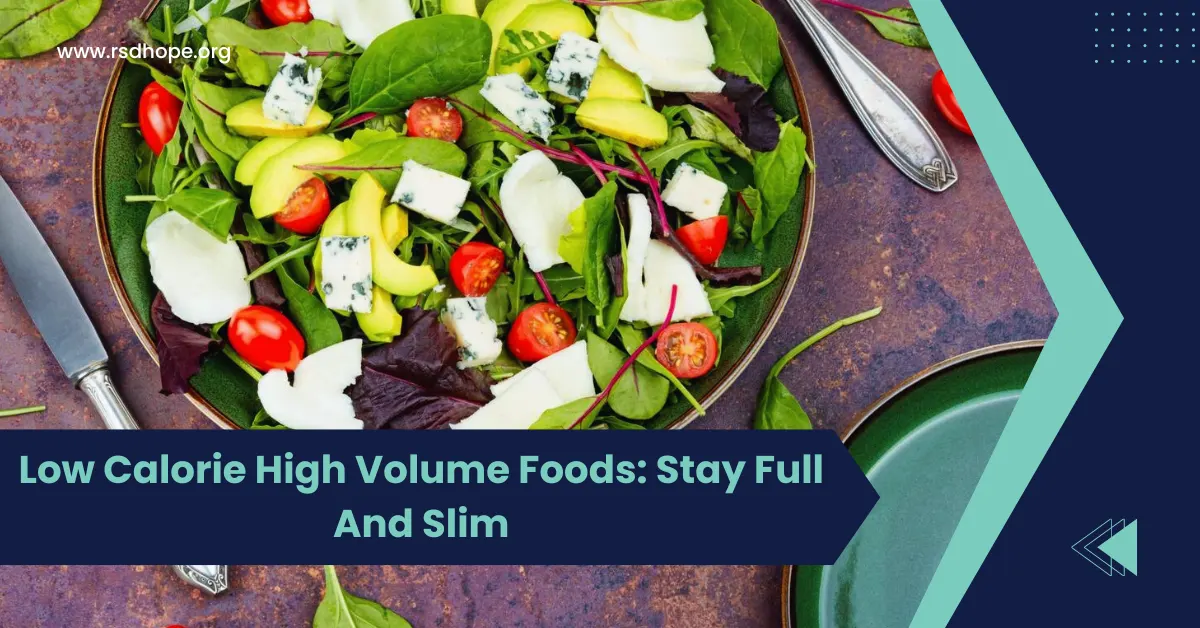In the quest for healthy eating and weight management, many people focus solely on counting calories. However, an often-overlooked aspect of a balanced diet is the concept of high-volume, low-calorie foods.
These nutrient-dense foods can help you feel full and satisfied while maintaining a calorie deficit, making them an essential component of a sustainable weight loss or maintenance plan. In this article, we’ll explore the benefits of incorporating high-volume, low-calorie foods into your diet and introduce you to the concept of volume eating.
Key Takeaways
- High-volume, low-calorie foods are nutrient-dense and help you feel full while keeping calorie intake low.
- Volume eating focuses on consuming larger quantities of low-calorie foods to promote satiety and weight management.
- Incorporating high-volume, low-calorie foods into your diet offers numerous health benefits, including weight loss, improved nutrition, and better overall health.
What Are High-Volume, Low-Calorie Foods?
High-volume, low-calorie foods are those that provide a substantial amount of food with relatively few calories. These foods typically have a high water content, fiber, or air content, which increases their volume without adding significant calories. Examples of high-volume, low-calorie foods include:
- Fruits: Berries, melons, apples, oranges, and grapefruits
- Vegetables: Leafy greens, cucumbers, zucchini, tomatoes, and bell peppers
- Whole grains: Oatmeal, quinoa, brown rice, and whole-wheat bread
- Lean proteins: Chicken breast, fish, tofu, and legumes
These foods are not only low in calories but also rich in essential vitamins, minerals, and fiber, making them a nutritious addition to any diet.
Also Read: Coffee For Weight Loss: Uncover The Surprising Facts
What is Volume Eating?
Volume eating is an approach to food consumption that emphasizes eating larger quantities of low-calorie, nutrient-dense foods to feel satisfied while keeping calorie intake in check. The principle behind volume eating is based on the concept of energy density, which refers to the number of calories per gram of food. Foods with low energy density provide fewer calories per gram, allowing you to eat more without exceeding your daily calorie goals.
By focusing on high-volume, low-calorie foods, volume eating helps you feel full and satisfied while consuming fewer calories overall. This approach can be particularly beneficial for those looking to lose weight or maintain a healthy weight, as it helps control hunger and prevents overeating.
Benefits of Incorporating Volume Eating into Your Diet
Incorporating high-volume, low-calorie foods and the principles of volume eating into your diet offers numerous benefits for weight management and overall health:
- Weight loss and maintenance: By consuming fewer calories while still feeling satisfied, volume eating can help you achieve and maintain a healthy weight.
- Improved satiety: High-volume, low-calorie foods help control hunger and reduce the likelihood of overeating, making it easier to stick to a balanced diet.
- Enhanced nutrition: Many high-volume, low-calorie foods are nutrient-dense, providing essential vitamins, minerals, and fiber that support overall health and well-being.
- Sustainable lifestyle change: Volume eating promotes a balanced, flexible approach to food consumption, making it a sustainable long-term strategy for healthy eating.
- Better overall health: By focusing on nutrient-dense, low-calorie foods, volume eating can help reduce the risk of chronic diseases such as obesity, diabetes, and heart disease.
Conclusion
Incorporating high-volume, low-calorie foods and the principles of volume eating into your diet can be a game-changer for those looking to manage their weight and improve overall health. By prioritizing nutrient-dense foods that keep you feeling full and satisfied, you can achieve your weight goals without feeling deprived or restricted.
As you embark on your healthy eating journey, remember that small, sustainable changes can lead to significant long-term results. Embrace the power of high-volume, low-calorie foods and discover a more enjoyable, satisfying path to a healthier you.
Read More: Is Watermelon Good For Weight Loss? Shed Pounds With This Fruit
FAQs
A: Yes, volume eating is a flexible approach that allows for the inclusion of favorite foods in moderation. Focus on incorporating high-volume, low-calorie foods as the foundation of your diet, and enjoy smaller portions of higher-calorie favorites as occasional treats.
A: Start by making simple swaps, such as replacing high-calorie snacks with fresh fruits and vegetables, or adding more leafy greens to your meals. Gradually increase your intake of whole grains, lean proteins, and nutrient-dense foods to make volume eating a sustainable habit.
A: On the contrary, high-volume, low-calorie foods are designed to help you feel full and satisfied. The high water content, fiber, and nutrient density of these foods promote satiety, reducing the likelihood of hunger and overeating.
A: While volume eating can be beneficial for most people, it’s always best to consult with a healthcare professional or registered dietitian before making significant changes to your diet, especially if you have specific health concerns or dietary requirements.
Sources:

